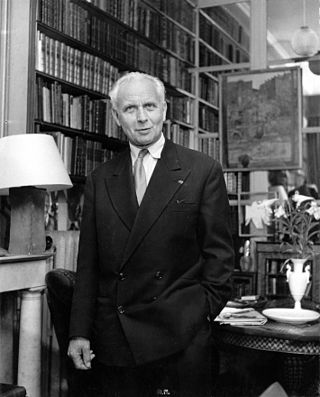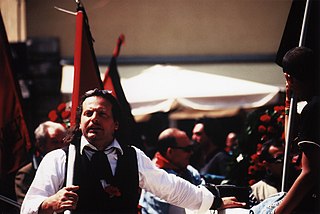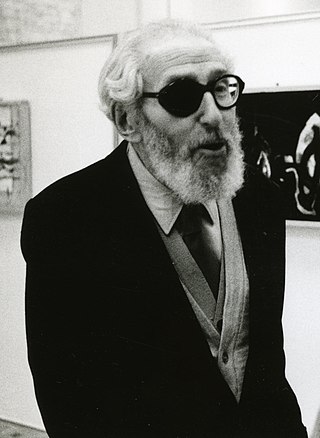
Albert Camus was a French philosopher, author, dramatist, journalist, world federalist, and political activist. He was the recipient of the 1957 Nobel Prize in Literature at the age of 44, the second-youngest recipient in history. His works include The Stranger, The Plague, The Myth of Sisyphus, The Fall and The Rebel.

The Situationist International (SI) was an international organization of social revolutionaries made up of avant-garde artists, intellectuals, and political theorists. It was prominent in Europe from its formation in 1957 to its dissolution in 1972. The intellectual foundations of the Situationist International were derived primarily from libertarian Marxism and the avant-garde art movements of the early 20th century, particularly Dada and Surrealism. Overall, situationist theory represented an attempt to synthesize this diverse field of theoretical disciplines into a modern and comprehensive critique of mid-20th century advanced capitalism.

Louis Aragon was a French poet who was one of the leading voices of the surrealist movement in France. He co-founded with André Breton and Philippe Soupault the surrealist review Littérature. He was also a novelist and editor, a long-time member of the Communist Party and a member of the Académie Goncourt. After 1959, he was a frequent nominee for the Nobel Prize in Literature.

Combat was a large movement in the French Resistance created in the non-occupied zone of France during the World War II (1939–1945).
Les Temps Modernes was a French journal, founded by Simone de Beauvoir, Jean-Paul Sartre, and Maurice Merleau-Ponty. Its first issue was published in October 1945. It was named after the 1936 film by Charlie Chaplin.
Arthur Stuart Ahluwalia Stronge Gilbert was an English literary scholar and translator. Among his translations into English are works by Alexis de Tocqueville, Édouard Dujardin, André Malraux, Antoine de Saint-Exupéry, Georges Simenon, Jean Cocteau, Albert Camus, and Jean-Paul Sartre. He also assisted in the translation of James Joyce's Ulysses into French.
Mario Prassinos was a French modernist painter, printmaker, illustrator, stage designer, and writer of Greek-Italian descent.

Gilles Dauvé is a French ultra-left political theorist, school teacher, and translator, associated with the development of communization theory.
Louis Pauwels was a French journalist and writer.

Anarchism in France can trace its roots to thinker Pierre-Joseph Proudhon, who grew up during the Restoration and was the first self-described anarchist. French anarchists fought in the Spanish Civil War as volunteers in the International Brigades. According to journalist Brian Doherty, "The number of people who subscribed to the anarchist movement's many publications was in the tens of thousands in France alone."
Pascal Pia, born Pierre Durand, was a French writer, journalist, illustrator and scholar. He also used the pseudonyms Pascal Rose, Pascal Fely and others.
The Notre-Dame Affair was an action performed by Michel Mourre, Serge Berna, Ghislain Desnoyers de Marbaix, and Jean Rullier, members of the radical wing of the Lettrist movement, on Easter Sunday, 9 April 1950, at Notre-Dame Cathedral in Paris, while the mass was aired live on national TV. Mourre, dressed in the habit of a Dominican friar and backed by his co-conspirators, chose a quiet moment in the Easter High Mass to climb to the rostrum and declaim before the whole congregation a blasphemous anti-sermon on the death of God, penned by Berna.
Maurice Nadeau was a French teacher, writer, literary critic, and editor. He was born in Paris.
Morvan Lebesque, was the Breton language name of Maurice Lebesque, a Breton nationalist activist and French journalist.
The Groupe du musée de l'Homme was a movement in the French resistance to the German occupation during the Second World War.
Le Quotidien de Paris was a French newspaper founded in 1974 by Philippe Tesson. Along with Le Quotidien du médecin and Le Quotidien du Pharmacien, Le Quotidien de Paris made up the Groupe Quotidien which employed over 550 individuals, with nearly all press organs now defunct. Philippe Tesson intended for it to be the successor to the daily newspaper Combat, of which he had been the editor-in-chief between 1960 and 1964. Combat included articles and editorials from a variety of opinions, as well as an in-depth coverage of cultural events in Paris. The survival of Le Quotidien de Paris during the 1980s and '90s was largely due to the success of another paper from the same publishing group, Le Quotidien du Médecin, which was run by Tesson's wife, Marie-Claude Tesson-Millet. In 1991 it distributed 35,000 newspapers across France. Its last issue appeared in 1996.

Claude Aveline, pen name of Evgen Avtsine, was a writer, publisher, editor, poet and member of the French Resistance. Aveline, who was born in Paris, France, has authored numerous books and writings throughout his writing career. He was known as a versatile author, writing novels, poems, screenplays, plays, articles, sayings, and more.

Edmond Charlot (1915–2004) was a French-Algerian publisher and editor. He is best known for his friendship with Albert Camus and for being his first publisher.
Albert Ollivier (1915-1964) was a French historian, author, journalist, politician and member of the French resistance. He was born on 1 May 1915 in Paris and died there on 18 July 1964.

Philippe Tesson was a French journalist and television columnist who primarily focused on theatre. In 1974, he founded the newspaper Le Quotidien de Paris, of which he was the owner and director of publication until 1994. He was also owner of the publishing house L'Avant-scène théâtre and the Théâtre de Poche-Montparnasse in Paris.










